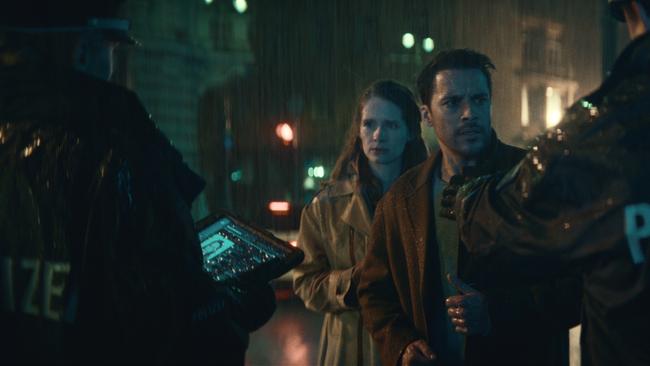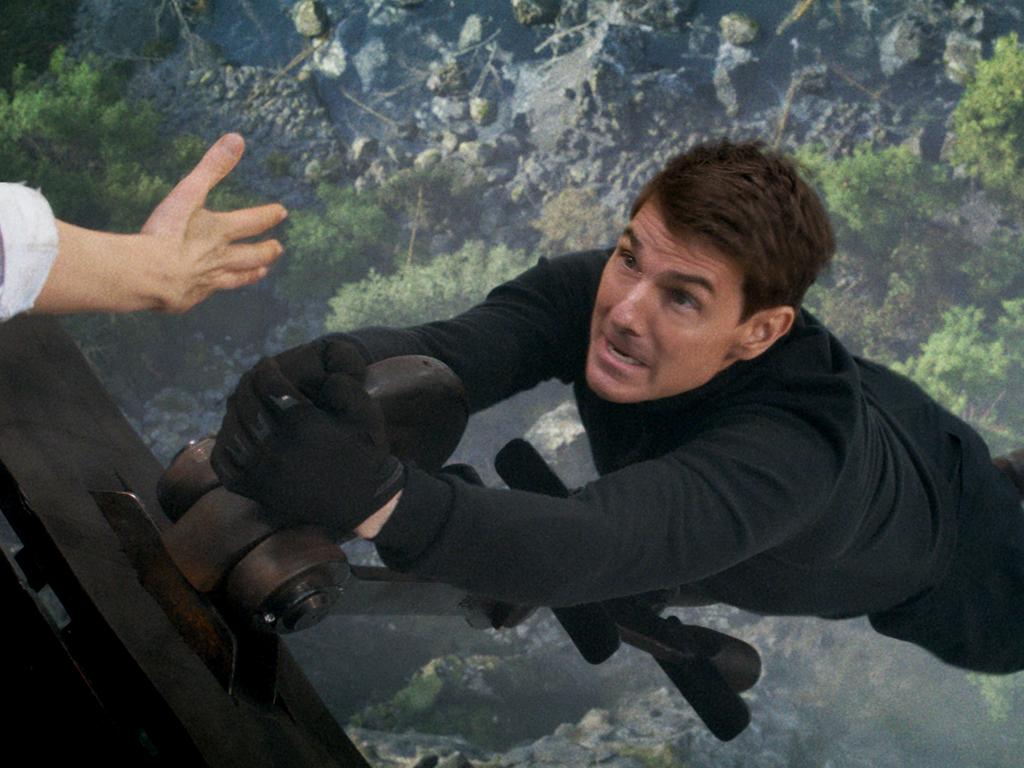It’s a pleasure to watch Robert De Niro in anything
About my Father is an oddball movie that had me laughing out loud, although perhaps not for reasons the filmmakers intended.

About My Father (PG)
In cinemas
★★★
Have you ever wanted to see a pony-tailed Robert De Niro primping and plucking women in a hair salon? Or chatting to a peacock he may need to kill? Or donning a stars and stripes jacket and hat to compete in an egg and spoon race?
If the answer is yes, then About My Father will work for you. It’s an oddball movie that had me laughing out loud, perhaps not for reasons the filmmakers intended, but I enjoyed it anyway.
One reason is the pure pleasure of watching De Niro in anything. In this movie, directed by Laura Terruso, there’s the added appeal of watching him work with actors who are hardly household names. I imagine them thinking something like, ‘‘Holy smoke I’m about to do a scene with God.’’
And indeed his character, Salvo Maniscalco, is described as a god early on. It’s the ponytailed 1980s and his son, in an introductory voice-over, tells us that his father came out from Sicily and set up a hairdressing business in Chicago.
He’s a man who values family and work, which he’s been doing for 50 years. “If you’re awake,’’ the son says, “You’ve gotta be working.”
That’s the backstory to this loosely-autobiographical film that co-stars stand-up comedian and actor Sebastian Maniscalco as himself. He co-wrote the script with Austen Earl.
De Niro met Maniscalco’s father to prepare for the role. The two actors have worked together before in Martin Scorsese’s The Irishman (2019).
In the present day, Sebastian is 42 and in love with Ellie (Leslie Bibb), who is an artist. Salvo, now ponytail-free, is still running the salon.
Sebastian wants to propose to Ellie and the perfect opportunity arises when her super rich parents, US senator Tigger (Kim Cattrall from Sex and the City) and hotel chain owner Bill (David Rasche) invite them to their summer estate for the July 4 weekend.
The only hitch is that Salvo, now a widower, has to come along.
When he’s told the family is so wealthy he can take a break from thinking about money, he says, “Where I come from that’s called dying.”
When he learns Bill handed over one of his hotels to his playboy eldest son, Lucky (Anders Holm), he says, “My father gave me a mule. The next day it died.”
Here we have the comedic tension of the plot: the wealth disparities and the generational differences. Each one is heightened by the bride-to-be’s other brother, Doug (Brett Dier), who is a hippie.
The scenes between Dier and De Niro are highlights. The script is patchy but there are some decent movie jokes.
“You look,’’ Sebastian tells his father when they arrive at the estate, “like the guy who killed John Wick’s dog.”
The question is whether stubborn Salvo will stick to his guns or relent for his son’s sake and be nice to people who sent their dog to a better school than the one his son went to. There are moments in this will he/won’t he back-and-forth where De Niro reminds us what a fine actor he is.
Before I watched this 89-minute movie I had a thought. Is it possible De Niro, who will turn 80 on August 17, will end up making more bad films than good ones?
I flipped through his filmography.
The good starts in 1973 with Scorsese’s Mean Streets and continues, in chronological order, with The Godfather Part II, Taxi Driver, The Last Tycoon, The Deer Hunter, Raging Bull, The King of Comedy, Once Upon a Time in America, The Mission, Midnight Run, Stanley & Iris, Goodfellas, Heat, Cop Land and, in 2019, The Irishman and Joker. His next film, due in October, is Scorsese’s Killers of the Flower Moon.
That answered my question.
No matter what you think of Meet the Parents, the Fockers franchise, Freelancers, The Sliver Linings Playbook, The Big Wedding, Killing Season (his only movie with John Travolta) Dirty Grandpa and its sequel, this new film and De Niro’s other possible missteps, he is an actor it has been a privilege to see.
Paradise (MA15+)
Netflix
★★★
Would you trade 15 years of your life for a million dollars? That’s the question put to an impoverished 18-year-old lad at the start of the German sci-fi thriller Paradise.
The person asking the question is Max (Kostja Ullmann), star salesman for Berlin-based Aeon, a corporation that buys chunks of people’s lifetimes and sells them on to its rich customers.
The donor ages the number of years they sell and the recipient de-ages by the same amount. It only works if there’s a DNA match.

The billionaire Aeon chief executive (Iris Berben), asks people to imagine what might have happened if Mozart, dead at 35, had lived to 100.
The 18-year-old says yes. The lottery-like lump sum is the only way he and his parents can make it out of a refugee camp. Fifteen years of his life for €700,000.
“If people have nothing but their youth, why stop them from profiting from it,” Max says when someone questions how he makes a living.
Then something happens that makes this seller of so-called paradise change his tune. His luxury apartment, which he shares with his wife Elena (Marlene Tanczik), is gutted by fire.
The insurance company will not pay. The bank demands the €2.5m mortgage be paid out. The only asset the couple have is something Max did not know about. His wife, a doctor at a local hospital, put up her life as collateral. The court rules: €2.5m equals 38 years.
The room where Elena makes the legally-mandated donation parallels a lethal injection execution chamber. The gurney, the straps, the needles, the people watching through one-way glass.
Elena does not age immediately. But by the time she wakes up the next morning, she looks as old as her parents. A scene where she meets them is heartbreaking.
There’s no Harrison Ford-like digital de-ageing in this 120-minute German language movie directed by Boris Kunz. The aged Elena is a different actor, Corinna Kirchhoff.
This forced ageing of Elena sets up the drama. Max believes the process can be reversed and convinces Elena to join him on the hunt for a matching donor.
The Aeon chief executive and her private army are out to stop them. Throw into the mix an anti-Aeon terrorist group that is executing anyone who “steals other people’s lifetimes” and we have a fast-paced chase thriller.
This is a well-made, thought-provoking movie set in the near future. It’s the sort of science fiction that feels closer to science than fiction.
The Aeon boss casually mentions that the climate crisis ended because the world’s richest 5 per cent paid for it to be fixed. So why shouldn’t they have the right to buy longer lives?
Yet reversing the clock is not enough. The next step is to stop it so that “age and death no longer define us but the other way round”.
I can imagine that being a goal in the real future but I doubt “us” includes people such as the young man in the refugee camp.





